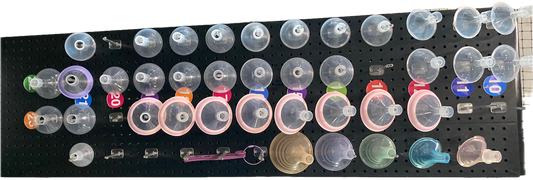
When baby stops nursing, it's a strike!
Share
"Hey, so all of the sudden my three month won't eat. He won't take my breast and if he does, it's a very short feed. He screams if I even put him in the position. I have milk and it's leaking out-- even shooting out now--because I'm so full. I tried a bottle with a slow nipple -- he took some and then started crying.
"He has NEVER been like this before. He loves breastfeeding and his weight is great - 20 pounds at 3 months. He is an awesome eater and I'm worried. Should I call the pediatrician? He's arching his back, do you think he has reflux? I'm worried because he hasn't had many wet diapers. He needs to eat and I feel like I am going to burst!"
When your baby's refusing to nurse, it’s called a nursing strike.
A nursing strike is when a baby who normally enjoys breastfeeding suddenly refuses to breastfeed. You might think a baby is weaning and done with breastfeeding, but if they are younger than 12 months, that is unlikely. In addition, most babies don't suddenly wean cold turkey, they gradually taper off breastfeeding over a period of weeks or months.
During a nursing strike, sometimes it is obvious why they stopped. For example, they bit you. You yelled in pain. They cried and next time you offered, baby said, "Nope. Not doing that again. No more nursing."
Don't fight it and don't force breastfeeding because that can make it worse.
Often, it takes detective work to figure out the why. It's important to stay calm and think back to what's been going on.
If baby's weight is great, you have a cushion of time. They are not going to starve if they don't nurse for a day. You, on the other hand will be very uncomfortable, so express or pump milk to prevent engorgement and plugged ducts. You may need to pump several times to stay comfortable.
If baby's weight is not great, you should still feed them by any means possible, while you are trying to understand why they aren't feeding from your breast.
You will make faster progress if you accept that they have a very good reason, from their perspective, to NOT breastfeed. Think about what that might be, take a longer term view, stay connected with your baby, stay optimistic and keep trying.
"So, if a baby has a very good reason, what might that be, from their view?"
Babies can strike for any reason. They are humans with their own sense of right and wrong, justice and injustice, fear and comfort.
What often happens is that something startled or bothered them while they were nursing and they got scared. They're afraid it will happen again. Therefore, if they don't nurse, it won't happen and they can't be scared.
Try to remember what might have happened just before they started refusing.
Was there a loud noise, like a dog barking, or a pan crashing off a counter? Did you yell while breastfeeding? No judgment, it happens!
Maybe they're sick? If they have an ear infection, upset tummy, reflux or a sore throat, nursing may be painful. If their nose is stuffy, they can't nurse and breathe at the same time. Coxsackie, Thrush or Hand, Foot and Mouth viruses can make their mouth sore, though your milk will soothe and heal it.
Maybe you are sick? If you have mastitis or a plugged duct, your milk can taste funny. It's still safe for them to drink, but it's not the same yumminess they are used to. If you ate a lot of garlic or asparagus, your milk is going to taste different than it usually does.
Sometimes babies gag on a forceful letdown of milk. Some babies get this all the time, but when its out of the ordinary, it can startle and result in a nursing strike.
Sometimes there's a new smell they don't like, like a new detergent, soap or deodorant. Baby is nursing and they're like, "Pee-Yew! what is that? Get me outta here!"
And sometimes, you have been so busy that they just gave up on you, and by extension, breastfeeding. This so-called 'holiday weaning' shows they need you to slow down and reconnect with them.
If you can figure out what it is, talk to your baby about it.
Apologize if you did something that scared them. Explain what happened and try to coax them back onto the breast by reassuring them that it won't happen again. Reassure them that you are their mommy, you love them and will protect them. Keep talking to them. Even though they may only be a few weeks old, they can understand you and sometimes, this is all you need to do.
There is no one magic solution.
If they still will not nurse, keep them skin to skin as much as you can. Keep snuggling skin-to-skin and keep offering without any pressure. Your attitude should be one of coaxing or encouraging them back to breastfeeding by making it their choice, not your will. It takes time and patience to rebuild trust.
Try breastfeeding again when they're sleeping or drowsy. Lay down with them for naps and see if that helps. Try taking a bath together to see if that relaxes both of you into breastfeeding.
You may find settling into a favorite position helps. Or you may find just the opposite and it's an unfamiliar positions that breaks the pattern.
If it continues more than 12 hours, offer breastmilk by bottle or cup. If they refuse milk for more than a day, it's a good idea to see the doctor to rule out injury or illness. Continue feeding expressed milk and when appropriate, solid food while you are waiting.
Some strikes continue for a few days to a week, though most last only 24 hours or so.
If your little one is still refusing, don't lose hope. You are an adult with a perspective of time. Keep it low key and optimistic. Monitor their response and work to rebuild their trust. All but the most determined baby can be coaxed back into breastfeeding because it's so good.







